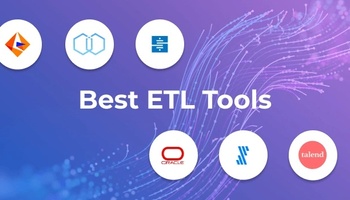BigCommerce is a top eCommerce platform that makes it easy to tackle the complexities of selling online. As stated on their homepage, you can, "fuel your business with all the capabilities of enterprise — without the cost or complexity."
Although BigCommerce offers a wide range of benefits, allowing companies to build, innovate, and grow quickly, if you're not utilizing your BigCommerce data, you're missing out on critical insights. After all, data is only valuable if you use it.
Whether you aim to improve data accuracy, gain deep context, or improve productivity, here is what you should consider when it comes to ETL for BigCommerce.
What BigCommerce Offers — And Why Extracting Data Matters
Big Commerce is an all-in-one eCommerce SaaS platform that comes with built-in hosting, payment integration, marketing tools, and advanced security. Allowing you to run your entire online business from a single location, BigCommerce makes it easy to grow — if, of course, you understand and utilize the features offered.
Some of the main features of BigCommerce include, but are not limited to:
- Responsive, customizable templates
- A secure shopping cart
- Integrations with gateways such as PayPal, Stripe, and Apple Pay
- Multi-currency support
- Drop-shipping
- Selling capabilities across numerous channels, including Amazon, Facebook, etc.
- Inventory management
- Marketing tools, ranging from email marketing to SEO
Although all of these features are great, running your online business in terms of selling and marketing is only half the battle. Understanding how your store is doing is critical for your ongoing success, which is why you need to consider the data you collect.
Why You Need a Data Pipeline
Running a business is no easy task, which is why so many opt for a simpler, more straightforward data solution. After all, in today's data-driven enterprise, there are few operations as critical as efficient data flow. By automating this process, you will be able to synchronize your BigCommerce data, loading it to a data warehouse of your choice.
A data pipeline can also route data to another application. For example, it can potentially integrate BigCommerce with Salesforce.
A data pipeline is built for efficiency, targeting the potential issues that could occur when manually transporting data from one system to another. These issues tend to grow in complexity as the number of data sources increases.
Related Reading: What is a Data Pipeline?
For example, say you're running your BigCommerce online store, and each day, you extract hundreds or even thousands of pieces of data. You may have CRM and sales pipeline data in Hubspot, marketing data in Mailchimp, payment data in Stripe, and analytics data in Google. While it's great that you're collecting and storing data, all of this information is stored in separate clouds.
Once you integrate your systems and bring all of your data together in one place to achieve real-time analytics, you'll be in a much better position to pull insights from it. In turn, you will be able to maximize customer satisfaction and brand loyalty — all while targeting some of the most common problems experienced in retail and eCommerce. Whether your goal is to improve inventory management, improve your marketing campaigns, or benefit from revenue forecasting, a data integration platform will make it much easier to extract and analyze data so that you can focus on what really matters — your business.
Why ETL Matters
In today's data-driven world, the information you collect is imperative to your company's long-term growth — and while you own a collection of invaluable data, it may currently be inaccessible. This is where ETL comes into play.
Extract, transform, load (ETL) is a three-step process, ending with your data warehouse. After data is extracted and transformed, the ETL tool you use will then organize and load that data so that you can more easily analyze your business intelligence.
Related Reading: What is ETL?
Here are just some of the benefits of ETL, which will directly impact your BigCommerce data:
- Automation — ETL allows you to collect, transform, and then load your data, doing so through automated processes. By saving you immense time and effort, this will directly support your ROI.
- Complex data simplified — If you were to try and analyze all of your raw data, it would be a full-time job in itself. ETL takes complex data, including everything from customer names to time zones, and simplifies it.
- Avoid human error — Unfortunately, mistakes are made when marketers manually analyze data — which can be costly, especially when one error leads to another. An ETL offers peace-of-mind, as well as a path to more informed decision-making.
What to Consider When Choosing the Best ETL for BigCommerce
Implementing an ETL within your BigCommerce strategy can help you summarize data in order to improve analysis and in turn, productivity and performance. With that being said, between writing custom ETL scripts in-house, using an ETL platform, and understanding ETL versus ELT, things can get confusing.
So, when choosing an ETL, what features should you consider?
1) Integration
The ETL solution you choose should be able to integrate with a wide range of databases and platforms. For example, your ETL solution should be able to create a new Salesforce account based on data from a BigCommerce customer — or create a new HubSpot contact. Some of the most popular uses include:
- Bringing BigCommerce data to Amazon Redshift
- Loading BigCommerce data to Google BigQuery
- The ability to ETL BigCommerce data to Snowflake
- Moving BigCommerce data to MYSQL
Although the above examples are popular case uses, your ETL solution should integrate with dozens of options, ranging from MailChimp to Quickbooks, Google Analytics to Square. This will provide you with the flexibility you require in order to analyze the data that means the most to your growing business.
Related Reading: Integrate BigCommerce with Airtable
2) Set-Up Process
The ultimate goal here is to enhance efficiency and productivity. That is why you should choose an ETL platform that allows you to easily set up integrations without the need to code. For example, Integrate.io offers a visual designer for building data pipelines between more than 100 data sources and destinations, including BigCommerce. For those who prefer more advanced customization and flexibility, Integrate.io also offers an API component.
Once integrations are set up, a point-and-click interface is incredibly valuable, as this will not require any code data management. This allows Integrate.io users to benefit from the power and high-volume data capabilities of an enterprise-grade ETL solution without the difficulty. You should also be mindful of automation, opting for processes that can be scheduled on a daily, weekly, or monthly basis.
3) Security
Look for features such as field-level encryption to protect sensitive data. When you're dealing with customer names and credit cards, for example, this data needs to be encrypted. Integrate.io offers this feature, allowing users to encrypt and decrypt data using their own unique encryption key.
In terms of security, it's also imperative that the platform you use follows all regulatory compliance laws for your region and industry, such as CCPA, GDPR, and HIPAA, among others.
Related Reading: Protecting Personal Data - GDPR, CCPA, and the Role of ETL
4) Support
Data integration can be challenging, which is why you'll want to partner with a platform that offers impeccable customer service. If you ever encounter any issues reading your data, access to fast. reliable support is critical. After all, data is operationally important, and you'll want to have a team of professionals on-hand.
Integrate.io for BigCommerce — Make the Most of Your Data
In order for your business to remain as efficient, adaptive, and agile as possible, accurate data flow is key. In terms of eCommerce, having access to order, inventory, and customer data can make all the difference between increasing your revenue and increasing your costs.
If you are the owner of an eCommerce business, you likely collect data in numerous cloud-based systems each and every day. For example, you may use Mailchimp for email marketing, HubSpot for CRM data, and Stripe for payment data. The issue with this is that all of your data is stored in separate places.
By using an ETL process to bring all of this data together in one place, you will be able to pull insights more efficiently. This is where your data warehouse comes into play, with options ranging from Google Cloud to Microsoft Azure SQL Data Warehouse.
Related Reading: What to Consider When Selecting a Data Warehouse for Your Business
The analytics that run in your data warehouse are typically much more comprehensive, providing an overall view of your company. In turn, this can help you increase long-term ROI and profitability. More specifically, the information in your data warehouse will allow you to:
- Monitor and adjust marketing campaigns
- Address and improve customer relationships
- Better understand key business metrics and company performance
- Predict future growth
- Consolidate data from various sources
Integrate.io will ETL your BigCommerce data so that you can gain invaluable insight without needing to write ETL scripts. This offers you the freedom to use the analytics tools of your choice, ranging from Chartio to Looker. Request a demo today and experience the platform for yourself.








